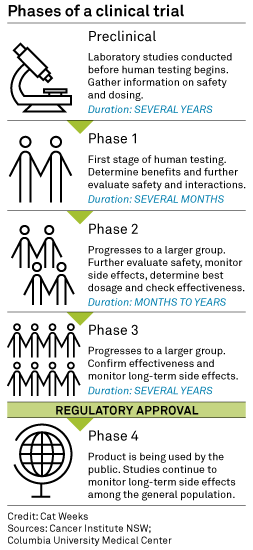S&P Global Offerings
Featured Topics
Featured Products
Events
S&P Global Offerings
Featured Topics
Featured Products
Events
S&P Global Offerings
Featured Topics
Featured Products
Events
S&P Global Offerings
Featured Topics
Featured Products
Events
11 May, 2021
By Etain Lavelle
Huntington's disease research suffered a double whammy after Swiss pharmaceutical giant Roche Holding AG halted late-stage trials of an experimental medicine and Wave Life Sciences Ltd. abandoned two drug studies for futility.
Roche stopped dosing patients with tominersen after an independent data monitoring committee questioned whether the drug's benefits outweighed its risks.
"Obviously, it's a very sad situation when we have to stop a pivotal program in a disease like Huntington's where there's such a high unmet need and such a terrible impact on these patients and their families," Bill Anderson, head of Roche's pharmaceuticals business, said on a call with reporters following Roche's first-quarter results. "It's a major setback for the field. But we will do everything we can to learn from the work that's been done. And if there's a way forward, we would certainly pursue it."
 |
The research stumbles, while not uncommon in the notoriously complex world of central nervous system drug development, leave only a single experimental compound in the last stage of trials usually required to seek marketing approval: pridopidine from Naarden, Netherlands-based Prilenia Therapeutics BV.
First developed at Israel's Teva Pharmaceutical Industries Ltd., where Prilenia CEO Michael Hayden was global head of R&D and chief scientific officer until 2017, pridopidine is being studied in phase 3 trials that will probably read out by the third quarter of 2022. That makes it the most advanced experimental compound in development for the hereditary disease, which affects about 70,000 people in the U.S. and Europe, the biggest potential markets for treatments. No medicines have been approved to either delay onset or slow the disease's progression.
Roche is following up with the patients on the trials of tominersen to thoroughly assess the effect of therapy. The Basel, Switzerland-based pharma company intends to continue research into Huntington's in its early-stage neurology research groups, as well as possibly via gene therapy, Anderson said.
Regulators have expressed more support for Huntington's drug developers after the influence and investment brought to bear by Roche, Europe's largest pharmaceutical company by revenue.
"They know all about Huntington's disease," Prilenia's Hayden said in an interview with S&P Global Market Intelligence. "I'm very grateful to Roche in particular, that they brought their muscle and their weight and their resources to raising awareness [of the disease] all over the world."
A number of early studies are still ongoing, including one by Roche's crosstown rival Novartis AG, which is investigating its experimental spinal muscular atrophy treatment, branaplam, as a treatment for Huntington's. The once-a-week oral therapy is in phase 1 trials after securing orphan-drug designation from the U.S. Food and Drug Administration, with the first regulatory submissions planned for 2025.
Gene therapy?
Other early-stage approaches to treating the neurodegenerative disease include one-time gene therapies in trials with companies including uniQure NV and Voyager Therapeutics Inc., which had a clinical hold lifted by the FDA on April 26.
But gene therapy may not be the approach to take, Roche's Anderson said. Huntington's disease is caused by a single mistake in a particular gene that triggers the formation of a toxic protein that kills nerve cells. Gene therapy introduces genetic material into cells to make up for abnormal genes or to produce a necessary protein.
"There are different types of genetic disorders," Anderson said. "Some of them, you have a case where you're missing a protein. And it's a relatively easier thing to add a protein when you're missing a protein with gene therapy, than if you have a genetic defect that is causing a toxic protein to form. In which case, you have to knock that down. That's a harder task for gene therapy. It doesn't mean it's not possible. It's just a trickier thing to do."
 |
Anderson said he was not referring to any research at Spark Therapeutics, the gene therapy company that Roche acquired in 2019.
Hayden, who is also a professor of medical genetics at the University of British Columbia, hopes to show the safety and tolerability already seen in more than 1,300 people to date. The phase 3 trial of the oral compound known as a sigma-1 receptor agonist is focused on the early Huntington's patient population, with a regulatory accepted endpoint of total functional capacity.
"We've learned deeply from the past. And we think we have it at least as close to right as we can now," Hayden said. "We believe that the study is quite de-risked, because we're not trying to look for new findings."
Pridopidine, which has patent protection until 2038, is easy to produce and available in tablet form. Hayden is keen to make the therapy readily available, should it gain approval, noting that the highest prevalence of the disease in the world was discovered in a remote tribe in Venezuela. Hayden also witnessed Huntington's impact at the start of his medical career in South Africa.
"I travelled the country and recognized that Huntington's disease was alive and well in Africa. … These were [many] people who were disenfranchised by apartheid and disenfranchised by this disease," Hayden said.
While not wanting to raise unrealistic hopes, both Hayden and Anderson signaled that Huntington's researchers are not undeterred by recent setbacks.
"There are lots of things that we're doing these days that we didn't think we can do a few years ago," Anderson said. "And so we remain hopeful that we will find a solution."